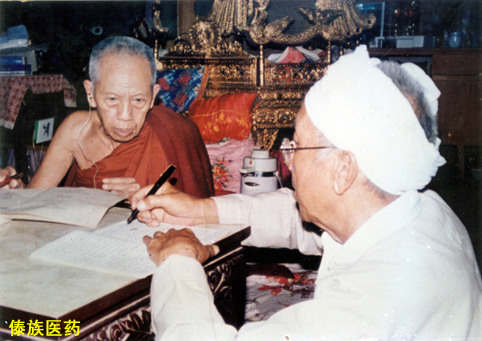
Ai Handan, a 51-year old pharmacist working at a hospital in south China's Yunnan province, has been lamenting the decline of his craft in recent years.
The type of pharmacology Ai practices is not seen in most hospitals. Ai deals in Dai ethnic pharmacology, a practice that dates back more than 2,500 years and features the use of rare herbs and other botanicals.
"Resources for finding rare herbs have been drained. More worryingly, fewer people are interested in hearing about traditional medicine," he said.
Ai works at China's only Dai ethnic hospital, located in Yunnan's Xishuangbanna Dai autonomous region. Dai ethnic medicine is based on a Buddhist belief that both the world and the human body are made up of four basic elements (wind, fire, water and earth).
"(Dai ethnic medicine) is nature's gift to the Dai ethnic group," Ai said. In the past, formulae for Dai medicines were incribed on palm leaves that were passed on from generation to generation. However, this practice, as well as many other features of Dai ethnic medicine, have largely been lost on younger generations.
23-year-old Ai Kan, Ai's eldest son, has refused to follow his father's career path, choosing instead to plant rubber on the hillsides surrounding their home city.
"Learning the craft is not easy, and a good return is not promised,"Ai Kan said.
To help preserve the ancient medical practices, Ai has been tutoring 49 students as part of a Dai ethnic medicine program being offered at the Xishuangbanna Vocational and Technical Institute.
Since 2008, more than 200 students have studied Dai ethnic medicine at the institute, taking academic courses and undergoing a one-year internship at the same hospital Ai works at.
"The curriculum includes basic Dai medicine theory, as well as diagnostic methods and traditional prescriptions. The textbooks were created by interviewing local villagers and writing down the treatments they described," Ai said.
Ai has also been working to purchase palm leaf manuscripts from local farmers, each of which contain valuable information and formulae for Dai ethnic medicine.
21-year-old Zeng Jiefeng is in her third year of studying Dai ethnic medicine. She wishes to eventually combine her knowledge of Dai ethnic medicine with traditional Chinese medicine.
Having both Dai and Han ancestry, Zeng has an advantage over her classmates in studying the trade, as she is able to read Chinese characters as they are written by the Dai people.
"Only four of my classmates come from the Dai ethnic group. Few Dai people have shown interest in learning Dai medicine," Zeng said.
Despite having taught more than 200 students over the last few years, it is not known if Ai will be able to bring about a true renaissance in Dai ethnic medicine. Those who study the trade have difficulty securing relevant jobs after completing their studies.
"Only two of the people who graduated the year before me continued to practice Dai medicine. The others returned to their hometowns or took up unrelated jobs," Zeng said.
Ai said that although registered certifications for practicing Dai ethnic medicine became nationally recognized in July 2006, actual jobs in the field have not been created. The hospital he works at cannot supply enough jobs for graduates, and sporadically-located private Dai medicine clinics cannot provide stable working environments.
"The Dai hospital has not publicly recruited graduates in recent years, and the few chances left by the insufficient development of Dai medicine and its industrialization have hindered the growth of the field," Ai said.
Zeng seems equally pessimistic. "If everyone leaves the field, there is not any possibility for the tradition to be inherited and promoted."
Zeng said her dream is to further her study in higher education to combine the knowledge of Dai and traditional Chinese medicine.

Copyright ©1999-2011 Chinanews.com. All rights reserved.
Reproduction in whole or in part without permission is prohibited.